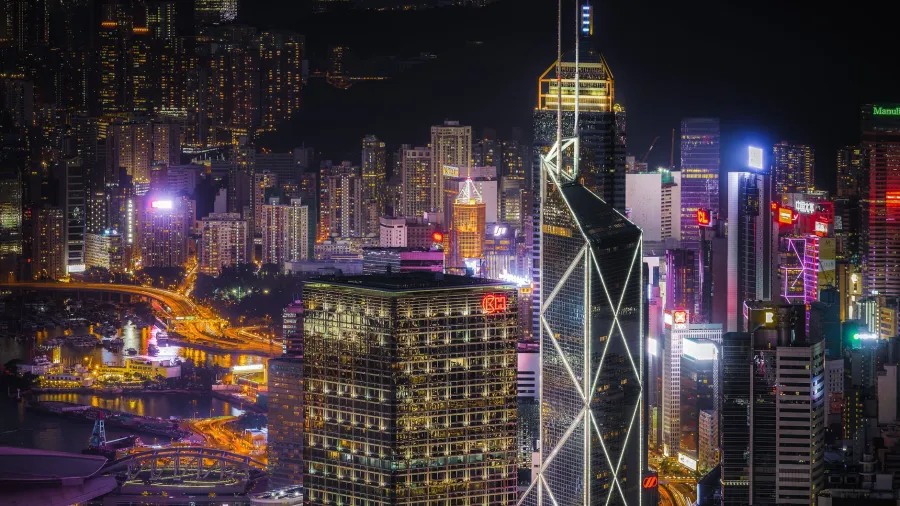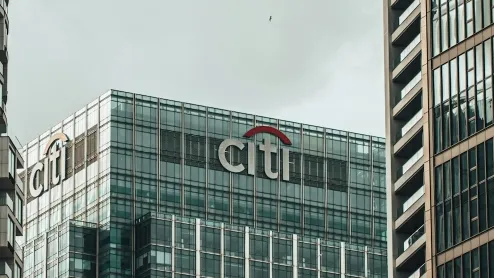
Hong Kong banks' asset quality battered by COVID-19 and protests
Exodus of corporate clients, mortgage risks, and dropping credit card use pose a big threat on revenues.
For Hong Kong, the COVID-19 outbreak couldn’t have come at a worse time. Industry performance and consumer sentiment are already at record lows over the past half year, hampered by the social protests that took the city by storm, and earlier waned by the onslaught of trade tensions and mainland China’s slowing economy. A combination of these factors drove the economy to contract 1.5%—its first annual decline since 2009. Now officials and enterprisesare bracing for an extended period of decline as airlines suspend flights and overseas markets tighten their borders.
This spells trouble for local banks, who may see their bad debts rise as large corporates and small and medium enterprises (SMEs) struggle to pay back their loans.
“Hong Kong is an international city and thrives on people coming and going to do business in Hong Kong. To prevent itself from importing coronavirus means shutting its borders to visitors from high risk locations. How well and how long the economy may endure such drastic measures has yet to be tested,” Brian Chan, partner, banking & capital markets for Hong Kong at Deloitte, told Asian Banking & Finance in an exclusive interview.
As of end-September 2019, loans related to travel and tourism, hospitality, and entertainment accounted for about 5% of systemwide loans, wholesale and retail trade comprised about 4%, credit cards and other personal loans about 8%, and property-related loans including mortgages about 30%.
The lower economic activity will also dent banks’ revenue for the year. “We would expect revenue and profit estimates to be revised downward given the current situation. In particular revenue will be under pressure: we can expect loan growth to be impacted due to lower economic activity and less demand for lending,” noted Paul McSheaffrey, partner, head of banking & capital markets for Hong Kong at KPMG.
McSheaffrey added that the potential impact on global growth from COVID-19 will also make any rise in interest rates unlikely.
Disrupted operations
Already, banks have closed down stores in an effort to mitigate the spread of the virus. Bank of East Asia temporarily closed 20 physical branches starting 1 February, including those in Causeway Bay and Wanchai Convention Plaza. UOB also shuttered its commercial banking centre in Kwun Tong until mid-February due to the outbreak.
A total of 243 bank branches have suspended their services since Chinese New Year, representing 19% of the 1,200 branches operating in the city, according to Deloitte. Some outlets that remained open also restricted their operating hours.

The full impact of these closures remains to be seen since most bank-related transactions are done electronically, noted Deloitte’s Chan.
“[Although] retail branches serve as one of many touch points that banks service their customers [they] are not the major channel for banking business any more. A typical retail bank handles 80-90% of its transactions through electronic means instead of through a bank teller,” he explained.
Instead, the exodus of corporate clients, mortgage risks, and dropping credit card use poses the biggest threat on banks’ revenues.
With corporates’ profitability and liquidity challenged, banks exposed to retail, restaurants, tourism, education and transportation sectors—the most impacted industries by the outbreak—will see credit deterioration. Of these, SMEs may not weather the economic shock and may go into bankruptcy should the outbreak persist, warned Chan.
Meanwhile, although the average loan-to-value (LTV) ratio provides ample cushion for banks, a drastic fall in property prices increases collateral risk.
Apart from prices, homebuyer demand will likely be dampened further by the outbreak, which was already strained by the protests, S&P Global Ratings’ stated in a report. The firm warned that transaction volumes during the SARS epidemic hit an all-time low, and history could repeat itself.
The length of the outbreak also weighs on workers’ wages and salaries, and any cuts would also slash credit card usage and push credit quality to deteriorate, Deloitte’s Chan added.
Similarly, S&P warned of a negative impact on banks’ credit card receivables should the unemployment rate rise. During the 2003 SARS crisis, Hong Kong's unemployment rate rose to an all-time high of about 8.5%. The jobless rate was 3.3% at end-2019, according to data from the Labour and Welfare Department.
Meanwhile, KPMG’s McSheaffrey sees a rise in bad debts the longer the outbreak persists. “This would probably be most likely to occur in the unsecured personal lending and SME sector as these are the sectors most impacted. We may also see some increase in bad debts for larger corporates, including potentially those with operations in China, although this will depend on the impact of government measures to support business.”
But McSheaffrey noted that, in general, the level of bad debts in Hong Kong’s banking sector has been low. “The banking sector is well capitalized and so should be able to absorb the increase in bad debts,” he added.
Fitch Ratings also said that Hong Kong banks are still well-positioned as of now, as less than 1% of mortgage loans were in negative equity compared with the 30% in June 2003 during the SARS crisis. Further, the LTV ratio for new mortgages was only 53% in December 2019 compared with 65% in June 2003.
A short-term outbreak would likely have little effect on their operations, added Fitch, given banks’ sufficient capital and liquidity buffers.
Likewise, Deloitte’s Chan said that local banks’ had so far not yet been affected.
“The number of people infected with COVID-19 is still very small. The loss to banks caused directly by coronavirus is therefore very limited. It is the precautionary measures implemented by governments, business, banks and customers that make an impact on the economy,” he noted.
Analysts agreed that the end-result will depend on how long the government’s measures will continue to take place.
Despite the branch closures, KPMG’s McSheaffrey has not seen any significant impact—at least, not yet. “We are not seeing any significant disruption to banking operations within Hong Kong. Banks have implemented their Business Continuity Plans. Teams who operate critical functions, such as remittances and payments, are generally working at alternate BCP sites and/or under split team arrangements to ensure these critical functions can still operate.”
Both Deloitte and Fitch agreed that there is still room to recover if the outbreak is contained fast.
“In general, if the outbreak is contained within months, certain banking business[es] might be delayed but may catch up later in the year,” said Deloitte’s Chan.
“However, if the outbreak sustains, banks may need to adjust itself to any structural changes in the economy to achieve their growth targets,” he concluded.
Prices of financial assets are also headed towards declines if disruptions from the outbreak persists, according to Moody’s Investors Service. “This will result in declines in the values of mark-to-market securities held by banks and falls in revenue from financial markets,” they concluded.


Protests’ impact lingers
The coronavirus upsurge came at the heels of the social protests that crippled Hong Kong’s economy in the second half of 2019 and riveted the rest of the world.
This has created a dent in profitability due to increased costs, as banks’ revisited their operating procedures and risk measures.
“The recent social unrest greatly affected banks' operations in two aspects. Most of the banks will review and revisit their Business Continuation Plan (BCP) just in case if their HQ is being compromised by the social unrest. The other major impact is to review and reinforce security measures to protect the branch operation particularly those with Chinese background and affiliation,” noted accounting firm BDO’s Managing Director of Assurance Clement Chan.
“The overall results of the social unrest have created a dent on the profitability because of increased costs incurred for the above-mentioned reaction and the forced closure due to sudden outbreak of movement and demonstration.”
BDO’s Chan said that they had noted cases where banks have to incur extra cost to purchase PCs and install appropriate alternative structure for BCP.
“We have seen access to branches at the regularly affected area are heavily guarded around the sensitive hours to minimise the chance of being sabotaged,” he added.
Any growth that banks’ expected to happen in the second half of the year was stopped and in some cases was turnaround to red, BDO’s Chan further noted.
HSBC, for example, increased its provision for expected credit losses by US$400m in Q3, with which the protests were cited as the driving force for the higher provisions. Despite this, HSBC reported a 7% growth in profits for its Hong Kong operations for the full year of 2019, and its local banking operations recorded growth.
In a similar vein, Citibank Hong Kong said in an exclusive correspondence that their business had not been materially impacted in Q4 2019, but noted that client sentiment remained cautious.
Citi Hong Kong’s franchise grew for the 12th consecutive quarter in Q3 2019. Revenues also rose 8% YoY, driven by solid growth in our balance sheet with average deposits up 10% and loans up 6%.
“There is a strong pipeline of business not only for Citi but across the market and this will support and underpin Hong Kong’s role as a major financial centre,” said James Griffiths, spokesperson of Citi Hong Kong. “Key Hong Kong corporates remain active and we continue to see good deal flow. Our treasury clients continue to use Hong Kong as a key treasury hub.”
M&A volumes in HK also reportedly remained healthy during the year, with inbound volumes up 50% to US$4.4b as of November YTD and outbound running at US$41b over the same period, he added.
BDO’s Chan added that banks who are less reliant on retail banking were likely not much affected by the protests. “In general, banks that are less reliant on retail banking business will find the social unrest less disruptive. However, the extent of negative sentiment created by the social movement will drag down the economy through its effect on the retail and property market which ultimately will affect all banks,” he said.
He left one piece of advice for banks: “Adopt a conservative strategy to sail through this storm.”



















 Advertise
Advertise












